|
|
|
Sort Order |
|
|
|
Items / Page
|
|
|
|
|
|
|
| Srl | Item |
| 1 |
ID:
147693
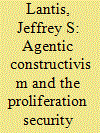

|
|
|
|
|
| Summary/Abstract |
Recent developments in global politics and international relations theory have raised questions about the strength of international norms. Critical constructivists identify instances of norm change, contestation, and even regress, arguing that norms may be less deeply internalized and more fragile than often assumed. This study builds on contemporary constructivist scholarship to advance a model of elite-driven norm change with stages of redefinition and substitution through contestation. It conducts a plausibility probe of the model by analyzing the development of the Proliferation Security Initiative, the US-led program that appeared designed to change normative principles from non-proliferation to counter-proliferation and from freedom of navigation on the high seas to maritime interdiction of suspect weapons and technology shipments. The model lends valuable insights on the evolution of norms to accommodate new realities over the last decade, and it suggests the need for more contingent and multi-linear theories of international cooperation.
|
|
|
|
|
|
|
|
|
|
|
|
|
|
|
|
| 2 |
ID:
147688
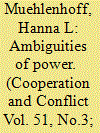

|
|
|
|
|
| Summary/Abstract |
Traditional definitions of power assume a unidirectional and coercive relationship between two actors. The debate about power in International Relations has questioned such a compulsive unidirectionality by pointing to the multidimensionality of power, as well as to the power of those who are traditionally seen at the receiving end. It is especially the latter aspect that has not been taken up seriously by empirical analyses. Moreover, research has ignored the complex power struggles the ‘receiving’ actors are engaged in and their possibility of resistance. If taken into account, these Foucauldian revisions of the concept of power allow us to analyse the development of the relationship between Turkey and the European Union (EU) since the turn of the millennium in a much more nuanced way than is often done in the existing Europeanisation literature. This case is particularly interesting, firstly because of the change in relations between the EU and Turkey, questioning the condition of a credible membership perspective under which the traditional form of power of the EU over its neighbourhood becomes effective. It secondly shows that the EU’s power extends much beyond the imposition of policy changes and has restructuring effects on society as a whole, while domestic actors are by no means passive recipients in this process.
|
|
|
|
|
|
|
|
|
|
|
|
|
|
|
|
| 3 |
ID:
147691
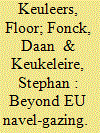

|
|
|
|
|
| Summary/Abstract |
Whilst concerns about the EU-centric character of EU foreign policy analysis have become more frequent in recent years, a systematic toolbox for diagnosing and remedying this problem is still lacking. This article’s contribution is twofold. First, it proposes a new typology of three approaches to foreign policy analysis, offering conceptual body and nuance to the debate on EU-centrism. The typology can be used for scrutinising existing analyses, as well as for shaping new research projects. Second, this typology is applied in a meta-analysis of post-Lisbon EU foreign policy scholarship: a built-for-purpose dataset of 451 articles was analysed, covering all work on EU foreign policy published in seven key journals for the period 2010–2014, was analysed. It was found that academic work on EU foreign policy wass indeed rife with EU-centric research questions, and, moreover, that this is the case irrespective of either the policy area under study or the focus of the journal.
|
|
|
|
|
|
|
|
|
|
|
|
|
|
|
|
| 4 |
ID:
147689
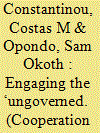

|
|
|
|
|
| Summary/Abstract |
This article explores biopolitical practices that extend beyond national borders and take the whole of humanity as their province. It looks at how attempts to secure and optimize conditions of living in Africa are not merely governmental in scope but also diplomatic in their conceptualization and conduct. It specifically examines the merging of diplomacy, defence and development (or the 3Ds), which purports to optimize life and shape ways of being in areas that cannot be ‘fully governed’ or resist domestication. It assesses the impact of diplomatic pluralization, characterized by the militarization of diplomacy and development, the diplomatization of the military, and new forms of diplomatic outreach, as practised by agencies such as AFRICOM. At stake in this exploration is an ethico-political critique of 3D engagement through which lives, conducts and relationships are negotiated in the postcolony.
|
|
|
|
|
|
|
|
|
|
|
|
|
|
|
|
| 5 |
ID:
147692


|
|
|
|
|
| Summary/Abstract |
This article applies the Foucauldian premise of governmentality and the analytics of government framework to demonstrate how exclusive modalities of power – of the European Union (EU) and Russia – and their competing rationalities relate, intersect and become, counter-intuitively, inextricable in their exercise of governance over the eastern neighbourhood. This particular approach focuses on power as a process to gauge the prospects for compatibility and cohabitation between the EU and Russia. Using original primary evidence, this article contends that cohabitation between these two exclusive power modalities is possible and even inevitable, if they were to legitimise their influence over the contested eastern region. It also exposes a fundamental flaw in the existing power systems, as demonstrated so vividly in the case of Ukraine – that is, a neglect for the essential value of freedom in fostering subjection to one’s authority, and the role of ‘the other’ in shaping the EU–Russian power relations in the contested region.
|
|
|
|
|
|
|
|
|
|
|
|
|
|
|
|
| 6 |
ID:
147690
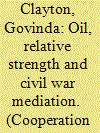

|
|
|
|
|
| Summary/Abstract |
Civil conflicts within oil-rich states tend to last longer but are less likely to be mediated and end in a peace agreement. This implies that oil-funded conflict is less likely to end through a mediated settlement, despite offering a greater opportunity for peaceful resolution. This article builds on this puzzle, focusing on the following research question: to what extent does the presence of non-lootable natural resources impact on the onset and outcome of civil war mediation? I argue that oil wealth raises the relative capacity of the incumbent, making it more challenging for insurgents to force mediation and gain the guarantees against defection that are needed to resolve the problem of credible commitment. This theory is tested on 319 civil conflict episodes between 1946 and 2004. The results support the argument that non-lootable natural resources exert a strong negative effect on both the onset and outcome of mediation. The analysis also reveals that the negative effect of petroleum wealth increases relative to a state’s hydrocarbon revenue (per capita). This is an important contribution to conflict research focused on natural resources that has previously overlooked the relationship between resource wealth and civil conflict management efforts.
|
|
|
|
|
|
|
|
|
|
|
|
|
|
|
|
| 7 |
ID:
147686
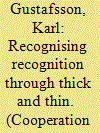

|
|
|
|
|
| Summary/Abstract |
Research on recognition in International Relations has demonstrated that states are not exclusively concerned about their physical security, but also anxious to be recognised by other states. What counts as recognition and non-/mis-recognition, however, is not always clear. Scholars of recognition seem to agree that recognition theory has not yet developed a persuasive way of recognising recognition. Providing a satisfactory answer to the question of how we recognise recognition and its denial is a necessary first step towards being able to convincingly theorise about recognition. This is especially important since recognition is often treated as a dependent variable—how states are recognised by other states is seen as influencing their behaviour, sometimes with military conflict as the outcome. This article further develops the concepts of ‘thin’ and ‘thick’ recognition as it addresses the problem of how to recognise recognition. Based on an analysis of empirical material on what, in Japan, has been interpreted as Chinese non- and mis-recognition of Japan, the article shows how concrete expressions of thin and thick recognition between established states can be recognised.
|
|
|
|
|
|
|
|
|
|
|
|
|
|
|
|
| 8 |
ID:
147687


|
|
|
|
|
| Summary/Abstract |
Peacebuilding attempts invoke a considerable amount of friction. In this article we argue that these frictional encounters can be made visible by focusing on articulations of resistance voiced by different actors in the intervention scene, including national elites and interveners. Departing from the discussion of the regionally led facilitation in Burundi, we show that the respective national elites and African interveners referred to different scales in order to legitimise their resistance: the Great Lakes Peace Initiative for Burundi resisted sedimented continental practices as well as international attempts to impose their conceptions of peace, whereas the Burundian elites repeatedly rejected regionally sponsored ‘solutions’ with reference to the domestic situation. Drawing on interviews with and statements by diverse national and regional forces, we show how claims to resist were articulated with respect to different spatial reference points and thereby explore how regional and domestic actors talked past each other.
|
|
|
|
|
|
|
|
|
|
|
|
|
|
|
|
|
|
|
|
|